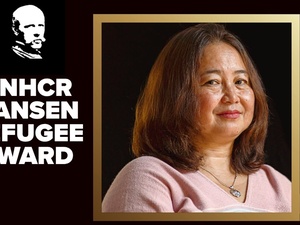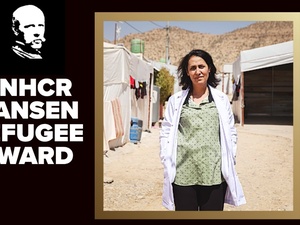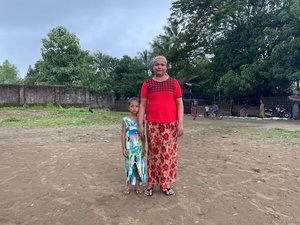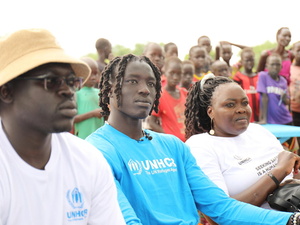Forcibly displaced in South Kivu face a struggle to survive
Forcibly displaced in South Kivu face a struggle to survive

Some of the people forced to flee Shabunda wait for assistance in a neighbouring territory in South Kivu province. Survival is a challenge.
BUNYAKIRI, Democratic Republic of the Congo, March 14 (2012) - Claudine* and her husband Pierre* fled their village in eastern Congo in early January and found shelter with thousands of others in Bunyakiri commune. But now the couple, like other internally displaced people (IDP) in South Kivu province's Kalehe territory, face a new challenge - the struggle to survive.
Fighting in the past four months, between the rebel Democratic Forces for the Liberation of Rwanda (FDLR), and a Maï Maï militia group has forced more than 100,000 people to leave the province's Shabunda territory and find shelter in Kalehe and other neighbouring territories. Most are farming folk, who relied on agriculture to survive in their villages.
But in the main areas of reception in Bunyakiri, land is scarce and most of the new arrivals cannot afford to buy a plot to grow enough food to survive on. They must work in the fields owned by members of the host communities. Pierre earns 800 Congolese francs (90 US cents) a day, too little to support his wife and six children.
The host community, themselves poor, have welcomed the new arrivals, providing them with shelter and sharing their meagre resources. "There is no conflict here," Charles, a representative of the people of Bunyakiri, told UNHCR visitors. "The displaced live in harmony with the local population."
Many of the locals, including Charles, empathize with the displaced because they have had to flee their own homes in the past. Three of Claudine and Pierre's children attend a school in Bunyakiri, where the teachers are IDPs.
However, the growing population of displaced brings problems that need immediate attention. "Most of the displaced have left in haste, without bringing anything, not even an ID card", explained Charles. "There is a great need for food and non-food assistance and medicine. People have no cooking pots, no plastic sheeting to cover their shelter."
He urged the local authorities and NGOs to help with more humanitarian assistance, including help for host families. Alexandra Krause, a protection officer in Bukavu, said that after being alerted to the difficulties, "UNHCR was able to mobilize the support of other humanitarian actors in order to address the huge needs of the displaced." But more help is needed.
The latest forced displacement has been prompted by fighting in this eastern region of the vast Democratic Republic of the Congo (DRC) between the predominantly ethnic Hutu, Democratic Forces for the Liberation of Rwanda (FDLR), and the Raïa Mutombok Maï Maï militia group.
Claudine's village lies in an area of Shabunda that has been under the control of the FDLR since 1996 and it's never been an easy life for civilians in the volatile region. The rebel group is composed mainly of Rwandan Hutus who arrived in the DRC after the 1994 genocide in Rwanda.
"The FDLR laid down the law, everything belonged to them. They imposed forced labour on the people, plundered our homes and fields, beat or killed those who resisted, and raped the women," she told UNHCR.
But things got worse for the villagers when the Maï Maï attacked the FDLR last November. The rebels from Rwanda accused villagers of supporting the Maï Maï. "They opened fire on the houses where we were hiding and burned some down with the people still inside," said Claudine.
The only option was escape. Carrying a minimum of belongings, Claudine and Pierre walked for three days through the forest with their children, including a one-month-old baby. Today, their village is deserted. But they hope that one day they can return. "We will go back home when the war is over and the FDLR have left," Claudine said.
* Names changed for protection reasons
By Fabrice Eliacin in Bunyakiri, Democratic Republic of the Congo









